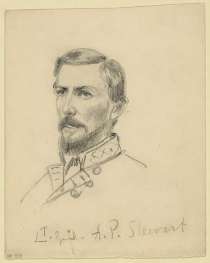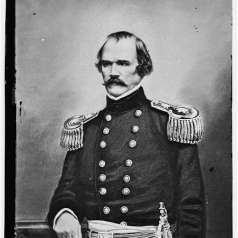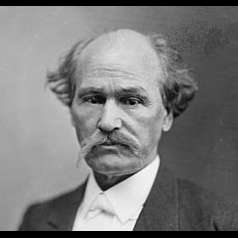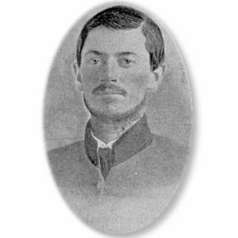
Alexander P. Stewart, educator and Confederate general, was born in Rogersville on October 2, 1821. Stewart graduated from the U.S. Military Academy at West Point in 1842. Three years later, he resigned his commission to become an educator. From that time until the beginning of the Civil War, he taught mathematics and natural and experimental philosophy at Cumberland University at Lebanon and at the University of Nashville.
Initially, Stewart opposed secession, but when Tennessee seceded he offered his services to the Confederacy. His first months in Confederate service were devoted to organizing camps to instruct new recruits. After commanding the heavy artillery and water batteries at Belmont, Missouri, he was appointed brigadier general on November 8, 1861. He was assigned a brigade command under General Leonidas Polk. In 1863 he was promoted to major general and in June 1864 to lieutenant general; he succeeded to the command of the corps following Polk's death. Stewart led his corps until the end of the war. He surrendered and was paroled with General Joseph E. Johnston's army at Greensboro, North Carolina, in May 1865.
Stewart fought in all the major battles of the Army of Tennessee--Shiloh, Perryville, Stones River, Chickamauga, Chattanooga, the Atlanta Campaign, Franklin, Nashville, and the Carolina Campaign. Stewart's brigade performed quite well at Stones River, aiding in pushing General Negley's division out of the cedar glade and capturing twelve artillery pieces. At Chickamauga, Stewart's division was part of General Longstreet's command that broke through the Union army put it to rout. In the disastrous battle of Nashville, Stewart's men stood up under overwhelming odds but finally retreated with the rest of General John Bell Hood's command.
After the war, Stewart resumed his professorship at Cumberland University. He engaged in business in St. Louis from 1870 to 1874 before becoming chancellor of the University of Mississippi from 1874 to 1888. After resigning his chancellorship, Stewart was appointed a commissioner of the Chickamauga and Chattanooga National Military Park. He served in this capacity until his death in Biloxi, Mississippi, on August 30, 1908. Stewart is buried in St. Louis, Missouri.
Tools
Key Facts
- A West point graduate and math teacher, Stewart first opposed secession.
- Fought in the major battles of the Army of Tennessee, including Shiloh, Perryville, Stones River, Chickamauga, Chattanooga, the Atlanta Campaign, Franklin and Nashville.







